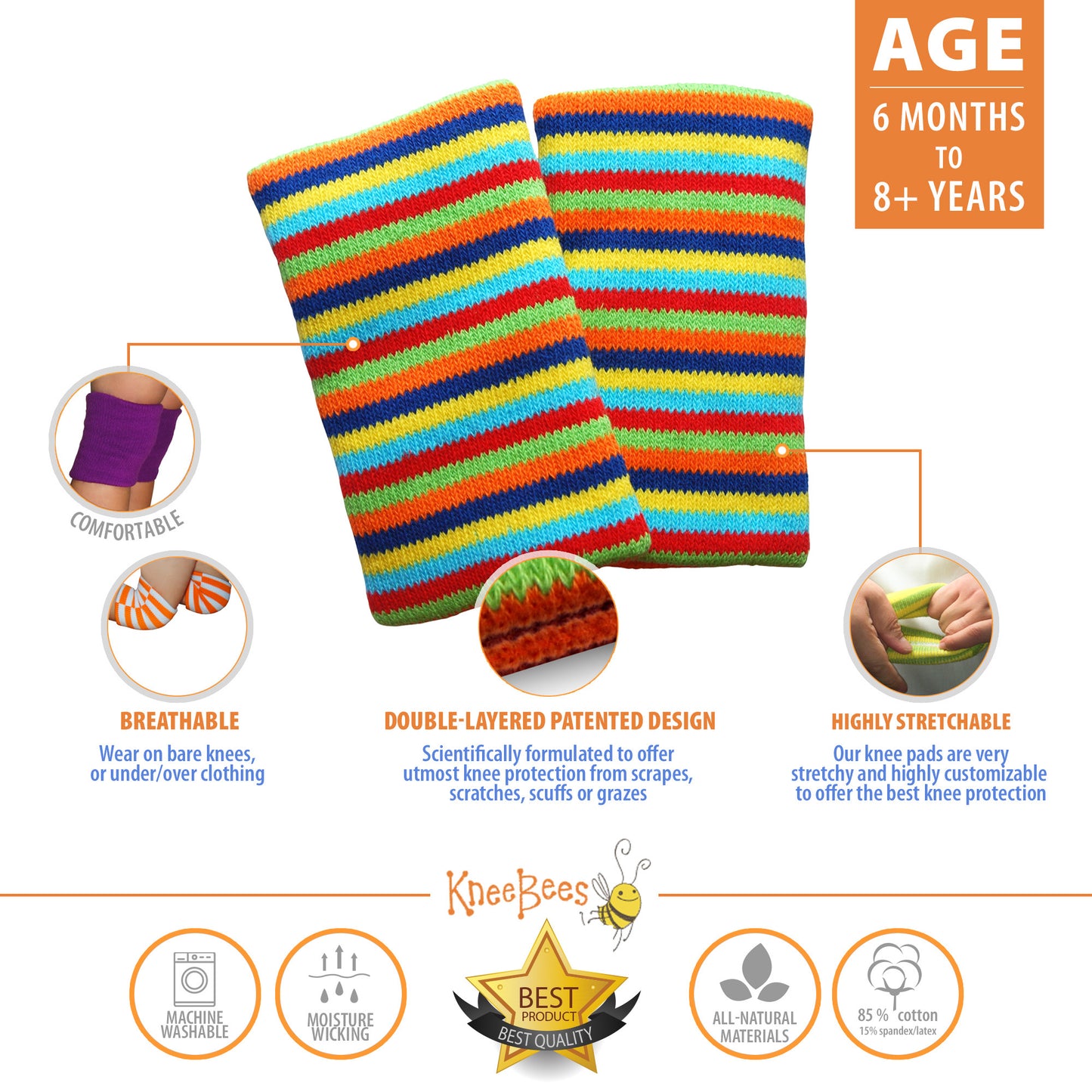 Photo taken from http://www.wikihow.com/[/caption]
"Stomachache
My child says his stomach hurts. How can I figure out what's causing it?
Pinpointing the cause of a child's stomach ache can be tricky, even if your child can tell you where it hurts. The key isn't just focusing on where the pain is but also looking at what other symptoms he's having.
If your child complains of a stomach ache when it's time to head to daycare or school, stress could be to blame. If he just had supper and dessert and he's complaining of a stomach ache but has no other symptoms, he may have eaten too much.
But if he's feverish and vomiting or has diarrhea in addition to tummy pain, you can be sure something more serious is going on.
The conditions below are the most common causes of stomach pain in children, although many others are possible. If your child has pain in his stomach that doesn't seem to go away or is getting worse, call his doctor. It's always better to err on the side of caution.
Constipation
The most common stomach problem in young children is constipation. If you notice that your child is having bowel movements less frequently – especially if it's been four or more days – and she's uncomfortable when she does have one, she's probably constipated. Another sign is dry, hard stools that are uncomfortable for her to pass.
Make sure your child is getting plenty of fluids throughout the day. And on the days when she seems constipated, feed her foods that produce looser stools (like oatmeal, apricots, pears, prunes, and peas) and cut back on those that tend to cause firmer stools (like bananas, apples and applesauce, carrots, rice, and squash).
If your child is still having trouble pooping, talk to her doctor about treatment options. He may suggest an over-the-counter stool softener, a lubricant such as mineral oil, a suppository, or laxatives if your child is very constipated.
Gas pain
Intestinal gas is another common cause of tummy ache. The best thing you can do is eliminate the offending food or habit that's triggering your child's gas. You might make a note of what your child has recently eaten when he has a bout of gas. One possibility is too much juice. Many juices – including apple juice and cherry juice – contain sorbitol, a nondigestible form of sugar.
When your child is uncomfortable, you can give him an anti-gas agent (such as Mylicon). But if he complains several times a day for more than three consecutive days, or he has other symptoms such as vomiting, diarrhea, or fever, call the doctor. Your child might have a more serious condition.
Stomach flu
Is your child vomiting or suffering from diarrhea in addition to abdominal pain? If so, she could have gastroenteritis, also known as stomach flu. It's the most common illness in the United States after colds.
If gastroenteritis is causing your child to vomit or have diarrhea and a fever and loss of appetite, it can quickly lead to dehydration, so it's important to make sure that your child is drinking plenty of fluids while she battles the illness. Give the doctor a call if you think your child may be becoming dehydrated.
Other infections
Believe it or not, the common cold and the flu can give a child a tummy ache. That's because much of the mucus produced during an upper respiratory illness drips down the throat and can irritate his stomach. Some children vomit to clear the mucus out of their system. It's not pretty, but it usually does the trick and the pain goes away.
A urinary tract infection and even an ear infection can sometimes cause nausea and vomiting.
Milk allergy or lactose intolerance
Symptoms of a milk allergy include vomiting, diarrhea, stomach pain, bloody stool, and rashes. In severe cases of milk allergy, a child may experience a life-threatening reaction called anaphylactic shock.
If your child has a milk allergy, her immune system is responding to the proteins found in milk. Tummy troubles related to milk can become full blown as a child switches from formula or breast milk to whole cow's milk and begins eating other dairy products such as ice cream and cheese.
For kids with a milk allergy, soy milk may be the answer, but it's not for everyone: Five to 10 percent of kids who are allergic to milk are also allergic to soy. In that case, you'll need to talk to your child's doctor or a nutritionist about how to make sure your child gets enough calcium from other foods.
Lactose intolerance happens when a person's body isn't producing lactase, the enzyme needed to digest lactose, the primary sugar in milk. Symptoms include diarrhea, nausea, abdominal cramps, bloating, and gas. Lactose intolerance is uncommon in young children and usually shows up later in childhood or during the teen years.
If your child is lactose intolerant, she can probably continue to have dairy as long as she takes a synthetic form of lactase, which you can find in an over-the-counter supplement. You can also buy lactose-free milk products.
Intestinal blockage
Call the doctor if your child seems to be fine one minute and is writhing in pain the next, especially if these symptoms are increasing in intensity and frequency and your child is vomiting. If you can't reach the doctor immediately, take your child to the emergency room.
These symptoms may signal an intestinal obstruction, such as intussusception (when one part of the bowel slides into the next part).
Poisonous substance
If your child has swallowed something toxic, like a drug, plant, medicine, or chemical, she may have a stomach ache and vomiting. Call the American Association of Poison Control Centers' national emergency hot line at (800) 222-1222 immediately.
She might also have a stomach ache from chronic exposure to lead (from soil, water, or old paint, for example). If you suspect lead poisoning, ask your doctor about having your child tested.
Motion sickness
Some children get motion sickness every time they ride in a vehicle. This can be a problem on road trips, or even on your daily drive to daycare or school. Experts believe that motion sickness happens when there's a disconnect between what your child sees and what he senses with the motion-sensitive parts of his body, such as his inner ears and some nerves.
Schedule plenty of stops during a trip so your child can get some fresh air. Having something in his tummy may help, so give him a small snack before getting in the car. And offer him lots of fluids to keep him hydrated. Don't give your child medications for motion sickness without talking to your child's doctor.
Functional abdominal pain
If your child has abdominal pain and there's no good explanation for it, she may have what doctors call functional abdominal pain. It may be chronic or intermittent, and it's a common cause of stomach complaints in children, most often between the ages of 5 and 6 years (and again at 9 and 10 years for girls). Though there's no conclusive explanation for it, experts think that the pain is often triggered by stress (such as a move or the start of school).
Stress-reduction methods, such as relaxation techniques, are sometimes helpful. Usually the pain disappears on its own, but depending on the severity of the pain and what your child's doctor thinks may be the source, he may suggest medication.
Other, less common causes of abdominal pain in children include appendicitis, inflammatory bowel disease (such as Crohn's disease and ulcerative colitis) and abdominal migraine (intense pain in the middle of the abdomen as a symptom of a migraine headache)."
Photo taken from http://www.wikihow.com/[/caption]
"Stomachache
My child says his stomach hurts. How can I figure out what's causing it?
Pinpointing the cause of a child's stomach ache can be tricky, even if your child can tell you where it hurts. The key isn't just focusing on where the pain is but also looking at what other symptoms he's having.
If your child complains of a stomach ache when it's time to head to daycare or school, stress could be to blame. If he just had supper and dessert and he's complaining of a stomach ache but has no other symptoms, he may have eaten too much.
But if he's feverish and vomiting or has diarrhea in addition to tummy pain, you can be sure something more serious is going on.
The conditions below are the most common causes of stomach pain in children, although many others are possible. If your child has pain in his stomach that doesn't seem to go away or is getting worse, call his doctor. It's always better to err on the side of caution.
Constipation
The most common stomach problem in young children is constipation. If you notice that your child is having bowel movements less frequently – especially if it's been four or more days – and she's uncomfortable when she does have one, she's probably constipated. Another sign is dry, hard stools that are uncomfortable for her to pass.
Make sure your child is getting plenty of fluids throughout the day. And on the days when she seems constipated, feed her foods that produce looser stools (like oatmeal, apricots, pears, prunes, and peas) and cut back on those that tend to cause firmer stools (like bananas, apples and applesauce, carrots, rice, and squash).
If your child is still having trouble pooping, talk to her doctor about treatment options. He may suggest an over-the-counter stool softener, a lubricant such as mineral oil, a suppository, or laxatives if your child is very constipated.
Gas pain
Intestinal gas is another common cause of tummy ache. The best thing you can do is eliminate the offending food or habit that's triggering your child's gas. You might make a note of what your child has recently eaten when he has a bout of gas. One possibility is too much juice. Many juices – including apple juice and cherry juice – contain sorbitol, a nondigestible form of sugar.
When your child is uncomfortable, you can give him an anti-gas agent (such as Mylicon). But if he complains several times a day for more than three consecutive days, or he has other symptoms such as vomiting, diarrhea, or fever, call the doctor. Your child might have a more serious condition.
Stomach flu
Is your child vomiting or suffering from diarrhea in addition to abdominal pain? If so, she could have gastroenteritis, also known as stomach flu. It's the most common illness in the United States after colds.
If gastroenteritis is causing your child to vomit or have diarrhea and a fever and loss of appetite, it can quickly lead to dehydration, so it's important to make sure that your child is drinking plenty of fluids while she battles the illness. Give the doctor a call if you think your child may be becoming dehydrated.
Other infections
Believe it or not, the common cold and the flu can give a child a tummy ache. That's because much of the mucus produced during an upper respiratory illness drips down the throat and can irritate his stomach. Some children vomit to clear the mucus out of their system. It's not pretty, but it usually does the trick and the pain goes away.
A urinary tract infection and even an ear infection can sometimes cause nausea and vomiting.
Milk allergy or lactose intolerance
Symptoms of a milk allergy include vomiting, diarrhea, stomach pain, bloody stool, and rashes. In severe cases of milk allergy, a child may experience a life-threatening reaction called anaphylactic shock.
If your child has a milk allergy, her immune system is responding to the proteins found in milk. Tummy troubles related to milk can become full blown as a child switches from formula or breast milk to whole cow's milk and begins eating other dairy products such as ice cream and cheese.
For kids with a milk allergy, soy milk may be the answer, but it's not for everyone: Five to 10 percent of kids who are allergic to milk are also allergic to soy. In that case, you'll need to talk to your child's doctor or a nutritionist about how to make sure your child gets enough calcium from other foods.
Lactose intolerance happens when a person's body isn't producing lactase, the enzyme needed to digest lactose, the primary sugar in milk. Symptoms include diarrhea, nausea, abdominal cramps, bloating, and gas. Lactose intolerance is uncommon in young children and usually shows up later in childhood or during the teen years.
If your child is lactose intolerant, she can probably continue to have dairy as long as she takes a synthetic form of lactase, which you can find in an over-the-counter supplement. You can also buy lactose-free milk products.
Intestinal blockage
Call the doctor if your child seems to be fine one minute and is writhing in pain the next, especially if these symptoms are increasing in intensity and frequency and your child is vomiting. If you can't reach the doctor immediately, take your child to the emergency room.
These symptoms may signal an intestinal obstruction, such as intussusception (when one part of the bowel slides into the next part).
Poisonous substance
If your child has swallowed something toxic, like a drug, plant, medicine, or chemical, she may have a stomach ache and vomiting. Call the American Association of Poison Control Centers' national emergency hot line at (800) 222-1222 immediately.
She might also have a stomach ache from chronic exposure to lead (from soil, water, or old paint, for example). If you suspect lead poisoning, ask your doctor about having your child tested.
Motion sickness
Some children get motion sickness every time they ride in a vehicle. This can be a problem on road trips, or even on your daily drive to daycare or school. Experts believe that motion sickness happens when there's a disconnect between what your child sees and what he senses with the motion-sensitive parts of his body, such as his inner ears and some nerves.
Schedule plenty of stops during a trip so your child can get some fresh air. Having something in his tummy may help, so give him a small snack before getting in the car. And offer him lots of fluids to keep him hydrated. Don't give your child medications for motion sickness without talking to your child's doctor.
Functional abdominal pain
If your child has abdominal pain and there's no good explanation for it, she may have what doctors call functional abdominal pain. It may be chronic or intermittent, and it's a common cause of stomach complaints in children, most often between the ages of 5 and 6 years (and again at 9 and 10 years for girls). Though there's no conclusive explanation for it, experts think that the pain is often triggered by stress (such as a move or the start of school).
Stress-reduction methods, such as relaxation techniques, are sometimes helpful. Usually the pain disappears on its own, but depending on the severity of the pain and what your child's doctor thinks may be the source, he may suggest medication.
Other, less common causes of abdominal pain in children include appendicitis, inflammatory bowel disease (such as Crohn's disease and ulcerative colitis) and abdominal migraine (intense pain in the middle of the abdomen as a symptom of a migraine headache)."
Possible Causes of Stomachache in Children
Share
Found on www.babycenter.com, reviewed by the BabyCenter Medical Advisory Board.
[caption id="attachment_1269" align="alignnone" width="300"] Photo taken from http://www.wikihow.com/[/caption]
"Stomachache
My child says his stomach hurts. How can I figure out what's causing it?
Pinpointing the cause of a child's stomach ache can be tricky, even if your child can tell you where it hurts. The key isn't just focusing on where the pain is but also looking at what other symptoms he's having.
If your child complains of a stomach ache when it's time to head to daycare or school, stress could be to blame. If he just had supper and dessert and he's complaining of a stomach ache but has no other symptoms, he may have eaten too much.
But if he's feverish and vomiting or has diarrhea in addition to tummy pain, you can be sure something more serious is going on.
The conditions below are the most common causes of stomach pain in children, although many others are possible. If your child has pain in his stomach that doesn't seem to go away or is getting worse, call his doctor. It's always better to err on the side of caution.
Constipation
The most common stomach problem in young children is constipation. If you notice that your child is having bowel movements less frequently – especially if it's been four or more days – and she's uncomfortable when she does have one, she's probably constipated. Another sign is dry, hard stools that are uncomfortable for her to pass.
Make sure your child is getting plenty of fluids throughout the day. And on the days when she seems constipated, feed her foods that produce looser stools (like oatmeal, apricots, pears, prunes, and peas) and cut back on those that tend to cause firmer stools (like bananas, apples and applesauce, carrots, rice, and squash).
If your child is still having trouble pooping, talk to her doctor about treatment options. He may suggest an over-the-counter stool softener, a lubricant such as mineral oil, a suppository, or laxatives if your child is very constipated.
Gas pain
Intestinal gas is another common cause of tummy ache. The best thing you can do is eliminate the offending food or habit that's triggering your child's gas. You might make a note of what your child has recently eaten when he has a bout of gas. One possibility is too much juice. Many juices – including apple juice and cherry juice – contain sorbitol, a nondigestible form of sugar.
When your child is uncomfortable, you can give him an anti-gas agent (such as Mylicon). But if he complains several times a day for more than three consecutive days, or he has other symptoms such as vomiting, diarrhea, or fever, call the doctor. Your child might have a more serious condition.
Stomach flu
Is your child vomiting or suffering from diarrhea in addition to abdominal pain? If so, she could have gastroenteritis, also known as stomach flu. It's the most common illness in the United States after colds.
If gastroenteritis is causing your child to vomit or have diarrhea and a fever and loss of appetite, it can quickly lead to dehydration, so it's important to make sure that your child is drinking plenty of fluids while she battles the illness. Give the doctor a call if you think your child may be becoming dehydrated.
Other infections
Believe it or not, the common cold and the flu can give a child a tummy ache. That's because much of the mucus produced during an upper respiratory illness drips down the throat and can irritate his stomach. Some children vomit to clear the mucus out of their system. It's not pretty, but it usually does the trick and the pain goes away.
A urinary tract infection and even an ear infection can sometimes cause nausea and vomiting.
Milk allergy or lactose intolerance
Symptoms of a milk allergy include vomiting, diarrhea, stomach pain, bloody stool, and rashes. In severe cases of milk allergy, a child may experience a life-threatening reaction called anaphylactic shock.
If your child has a milk allergy, her immune system is responding to the proteins found in milk. Tummy troubles related to milk can become full blown as a child switches from formula or breast milk to whole cow's milk and begins eating other dairy products such as ice cream and cheese.
For kids with a milk allergy, soy milk may be the answer, but it's not for everyone: Five to 10 percent of kids who are allergic to milk are also allergic to soy. In that case, you'll need to talk to your child's doctor or a nutritionist about how to make sure your child gets enough calcium from other foods.
Lactose intolerance happens when a person's body isn't producing lactase, the enzyme needed to digest lactose, the primary sugar in milk. Symptoms include diarrhea, nausea, abdominal cramps, bloating, and gas. Lactose intolerance is uncommon in young children and usually shows up later in childhood or during the teen years.
If your child is lactose intolerant, she can probably continue to have dairy as long as she takes a synthetic form of lactase, which you can find in an over-the-counter supplement. You can also buy lactose-free milk products.
Intestinal blockage
Call the doctor if your child seems to be fine one minute and is writhing in pain the next, especially if these symptoms are increasing in intensity and frequency and your child is vomiting. If you can't reach the doctor immediately, take your child to the emergency room.
These symptoms may signal an intestinal obstruction, such as intussusception (when one part of the bowel slides into the next part).
Poisonous substance
If your child has swallowed something toxic, like a drug, plant, medicine, or chemical, she may have a stomach ache and vomiting. Call the American Association of Poison Control Centers' national emergency hot line at (800) 222-1222 immediately.
She might also have a stomach ache from chronic exposure to lead (from soil, water, or old paint, for example). If you suspect lead poisoning, ask your doctor about having your child tested.
Motion sickness
Some children get motion sickness every time they ride in a vehicle. This can be a problem on road trips, or even on your daily drive to daycare or school. Experts believe that motion sickness happens when there's a disconnect between what your child sees and what he senses with the motion-sensitive parts of his body, such as his inner ears and some nerves.
Schedule plenty of stops during a trip so your child can get some fresh air. Having something in his tummy may help, so give him a small snack before getting in the car. And offer him lots of fluids to keep him hydrated. Don't give your child medications for motion sickness without talking to your child's doctor.
Functional abdominal pain
If your child has abdominal pain and there's no good explanation for it, she may have what doctors call functional abdominal pain. It may be chronic or intermittent, and it's a common cause of stomach complaints in children, most often between the ages of 5 and 6 years (and again at 9 and 10 years for girls). Though there's no conclusive explanation for it, experts think that the pain is often triggered by stress (such as a move or the start of school).
Stress-reduction methods, such as relaxation techniques, are sometimes helpful. Usually the pain disappears on its own, but depending on the severity of the pain and what your child's doctor thinks may be the source, he may suggest medication.
Other, less common causes of abdominal pain in children include appendicitis, inflammatory bowel disease (such as Crohn's disease and ulcerative colitis) and abdominal migraine (intense pain in the middle of the abdomen as a symptom of a migraine headache)."
Photo taken from http://www.wikihow.com/[/caption]
"Stomachache
My child says his stomach hurts. How can I figure out what's causing it?
Pinpointing the cause of a child's stomach ache can be tricky, even if your child can tell you where it hurts. The key isn't just focusing on where the pain is but also looking at what other symptoms he's having.
If your child complains of a stomach ache when it's time to head to daycare or school, stress could be to blame. If he just had supper and dessert and he's complaining of a stomach ache but has no other symptoms, he may have eaten too much.
But if he's feverish and vomiting or has diarrhea in addition to tummy pain, you can be sure something more serious is going on.
The conditions below are the most common causes of stomach pain in children, although many others are possible. If your child has pain in his stomach that doesn't seem to go away or is getting worse, call his doctor. It's always better to err on the side of caution.
Constipation
The most common stomach problem in young children is constipation. If you notice that your child is having bowel movements less frequently – especially if it's been four or more days – and she's uncomfortable when she does have one, she's probably constipated. Another sign is dry, hard stools that are uncomfortable for her to pass.
Make sure your child is getting plenty of fluids throughout the day. And on the days when she seems constipated, feed her foods that produce looser stools (like oatmeal, apricots, pears, prunes, and peas) and cut back on those that tend to cause firmer stools (like bananas, apples and applesauce, carrots, rice, and squash).
If your child is still having trouble pooping, talk to her doctor about treatment options. He may suggest an over-the-counter stool softener, a lubricant such as mineral oil, a suppository, or laxatives if your child is very constipated.
Gas pain
Intestinal gas is another common cause of tummy ache. The best thing you can do is eliminate the offending food or habit that's triggering your child's gas. You might make a note of what your child has recently eaten when he has a bout of gas. One possibility is too much juice. Many juices – including apple juice and cherry juice – contain sorbitol, a nondigestible form of sugar.
When your child is uncomfortable, you can give him an anti-gas agent (such as Mylicon). But if he complains several times a day for more than three consecutive days, or he has other symptoms such as vomiting, diarrhea, or fever, call the doctor. Your child might have a more serious condition.
Stomach flu
Is your child vomiting or suffering from diarrhea in addition to abdominal pain? If so, she could have gastroenteritis, also known as stomach flu. It's the most common illness in the United States after colds.
If gastroenteritis is causing your child to vomit or have diarrhea and a fever and loss of appetite, it can quickly lead to dehydration, so it's important to make sure that your child is drinking plenty of fluids while she battles the illness. Give the doctor a call if you think your child may be becoming dehydrated.
Other infections
Believe it or not, the common cold and the flu can give a child a tummy ache. That's because much of the mucus produced during an upper respiratory illness drips down the throat and can irritate his stomach. Some children vomit to clear the mucus out of their system. It's not pretty, but it usually does the trick and the pain goes away.
A urinary tract infection and even an ear infection can sometimes cause nausea and vomiting.
Milk allergy or lactose intolerance
Symptoms of a milk allergy include vomiting, diarrhea, stomach pain, bloody stool, and rashes. In severe cases of milk allergy, a child may experience a life-threatening reaction called anaphylactic shock.
If your child has a milk allergy, her immune system is responding to the proteins found in milk. Tummy troubles related to milk can become full blown as a child switches from formula or breast milk to whole cow's milk and begins eating other dairy products such as ice cream and cheese.
For kids with a milk allergy, soy milk may be the answer, but it's not for everyone: Five to 10 percent of kids who are allergic to milk are also allergic to soy. In that case, you'll need to talk to your child's doctor or a nutritionist about how to make sure your child gets enough calcium from other foods.
Lactose intolerance happens when a person's body isn't producing lactase, the enzyme needed to digest lactose, the primary sugar in milk. Symptoms include diarrhea, nausea, abdominal cramps, bloating, and gas. Lactose intolerance is uncommon in young children and usually shows up later in childhood or during the teen years.
If your child is lactose intolerant, she can probably continue to have dairy as long as she takes a synthetic form of lactase, which you can find in an over-the-counter supplement. You can also buy lactose-free milk products.
Intestinal blockage
Call the doctor if your child seems to be fine one minute and is writhing in pain the next, especially if these symptoms are increasing in intensity and frequency and your child is vomiting. If you can't reach the doctor immediately, take your child to the emergency room.
These symptoms may signal an intestinal obstruction, such as intussusception (when one part of the bowel slides into the next part).
Poisonous substance
If your child has swallowed something toxic, like a drug, plant, medicine, or chemical, she may have a stomach ache and vomiting. Call the American Association of Poison Control Centers' national emergency hot line at (800) 222-1222 immediately.
She might also have a stomach ache from chronic exposure to lead (from soil, water, or old paint, for example). If you suspect lead poisoning, ask your doctor about having your child tested.
Motion sickness
Some children get motion sickness every time they ride in a vehicle. This can be a problem on road trips, or even on your daily drive to daycare or school. Experts believe that motion sickness happens when there's a disconnect between what your child sees and what he senses with the motion-sensitive parts of his body, such as his inner ears and some nerves.
Schedule plenty of stops during a trip so your child can get some fresh air. Having something in his tummy may help, so give him a small snack before getting in the car. And offer him lots of fluids to keep him hydrated. Don't give your child medications for motion sickness without talking to your child's doctor.
Functional abdominal pain
If your child has abdominal pain and there's no good explanation for it, she may have what doctors call functional abdominal pain. It may be chronic or intermittent, and it's a common cause of stomach complaints in children, most often between the ages of 5 and 6 years (and again at 9 and 10 years for girls). Though there's no conclusive explanation for it, experts think that the pain is often triggered by stress (such as a move or the start of school).
Stress-reduction methods, such as relaxation techniques, are sometimes helpful. Usually the pain disappears on its own, but depending on the severity of the pain and what your child's doctor thinks may be the source, he may suggest medication.
Other, less common causes of abdominal pain in children include appendicitis, inflammatory bowel disease (such as Crohn's disease and ulcerative colitis) and abdominal migraine (intense pain in the middle of the abdomen as a symptom of a migraine headache)."
 Photo taken from http://www.wikihow.com/[/caption]
"Stomachache
My child says his stomach hurts. How can I figure out what's causing it?
Pinpointing the cause of a child's stomach ache can be tricky, even if your child can tell you where it hurts. The key isn't just focusing on where the pain is but also looking at what other symptoms he's having.
If your child complains of a stomach ache when it's time to head to daycare or school, stress could be to blame. If he just had supper and dessert and he's complaining of a stomach ache but has no other symptoms, he may have eaten too much.
But if he's feverish and vomiting or has diarrhea in addition to tummy pain, you can be sure something more serious is going on.
The conditions below are the most common causes of stomach pain in children, although many others are possible. If your child has pain in his stomach that doesn't seem to go away or is getting worse, call his doctor. It's always better to err on the side of caution.
Constipation
The most common stomach problem in young children is constipation. If you notice that your child is having bowel movements less frequently – especially if it's been four or more days – and she's uncomfortable when she does have one, she's probably constipated. Another sign is dry, hard stools that are uncomfortable for her to pass.
Make sure your child is getting plenty of fluids throughout the day. And on the days when she seems constipated, feed her foods that produce looser stools (like oatmeal, apricots, pears, prunes, and peas) and cut back on those that tend to cause firmer stools (like bananas, apples and applesauce, carrots, rice, and squash).
If your child is still having trouble pooping, talk to her doctor about treatment options. He may suggest an over-the-counter stool softener, a lubricant such as mineral oil, a suppository, or laxatives if your child is very constipated.
Gas pain
Intestinal gas is another common cause of tummy ache. The best thing you can do is eliminate the offending food or habit that's triggering your child's gas. You might make a note of what your child has recently eaten when he has a bout of gas. One possibility is too much juice. Many juices – including apple juice and cherry juice – contain sorbitol, a nondigestible form of sugar.
When your child is uncomfortable, you can give him an anti-gas agent (such as Mylicon). But if he complains several times a day for more than three consecutive days, or he has other symptoms such as vomiting, diarrhea, or fever, call the doctor. Your child might have a more serious condition.
Stomach flu
Is your child vomiting or suffering from diarrhea in addition to abdominal pain? If so, she could have gastroenteritis, also known as stomach flu. It's the most common illness in the United States after colds.
If gastroenteritis is causing your child to vomit or have diarrhea and a fever and loss of appetite, it can quickly lead to dehydration, so it's important to make sure that your child is drinking plenty of fluids while she battles the illness. Give the doctor a call if you think your child may be becoming dehydrated.
Other infections
Believe it or not, the common cold and the flu can give a child a tummy ache. That's because much of the mucus produced during an upper respiratory illness drips down the throat and can irritate his stomach. Some children vomit to clear the mucus out of their system. It's not pretty, but it usually does the trick and the pain goes away.
A urinary tract infection and even an ear infection can sometimes cause nausea and vomiting.
Milk allergy or lactose intolerance
Symptoms of a milk allergy include vomiting, diarrhea, stomach pain, bloody stool, and rashes. In severe cases of milk allergy, a child may experience a life-threatening reaction called anaphylactic shock.
If your child has a milk allergy, her immune system is responding to the proteins found in milk. Tummy troubles related to milk can become full blown as a child switches from formula or breast milk to whole cow's milk and begins eating other dairy products such as ice cream and cheese.
For kids with a milk allergy, soy milk may be the answer, but it's not for everyone: Five to 10 percent of kids who are allergic to milk are also allergic to soy. In that case, you'll need to talk to your child's doctor or a nutritionist about how to make sure your child gets enough calcium from other foods.
Lactose intolerance happens when a person's body isn't producing lactase, the enzyme needed to digest lactose, the primary sugar in milk. Symptoms include diarrhea, nausea, abdominal cramps, bloating, and gas. Lactose intolerance is uncommon in young children and usually shows up later in childhood or during the teen years.
If your child is lactose intolerant, she can probably continue to have dairy as long as she takes a synthetic form of lactase, which you can find in an over-the-counter supplement. You can also buy lactose-free milk products.
Intestinal blockage
Call the doctor if your child seems to be fine one minute and is writhing in pain the next, especially if these symptoms are increasing in intensity and frequency and your child is vomiting. If you can't reach the doctor immediately, take your child to the emergency room.
These symptoms may signal an intestinal obstruction, such as intussusception (when one part of the bowel slides into the next part).
Poisonous substance
If your child has swallowed something toxic, like a drug, plant, medicine, or chemical, she may have a stomach ache and vomiting. Call the American Association of Poison Control Centers' national emergency hot line at (800) 222-1222 immediately.
She might also have a stomach ache from chronic exposure to lead (from soil, water, or old paint, for example). If you suspect lead poisoning, ask your doctor about having your child tested.
Motion sickness
Some children get motion sickness every time they ride in a vehicle. This can be a problem on road trips, or even on your daily drive to daycare or school. Experts believe that motion sickness happens when there's a disconnect between what your child sees and what he senses with the motion-sensitive parts of his body, such as his inner ears and some nerves.
Schedule plenty of stops during a trip so your child can get some fresh air. Having something in his tummy may help, so give him a small snack before getting in the car. And offer him lots of fluids to keep him hydrated. Don't give your child medications for motion sickness without talking to your child's doctor.
Functional abdominal pain
If your child has abdominal pain and there's no good explanation for it, she may have what doctors call functional abdominal pain. It may be chronic or intermittent, and it's a common cause of stomach complaints in children, most often between the ages of 5 and 6 years (and again at 9 and 10 years for girls). Though there's no conclusive explanation for it, experts think that the pain is often triggered by stress (such as a move or the start of school).
Stress-reduction methods, such as relaxation techniques, are sometimes helpful. Usually the pain disappears on its own, but depending on the severity of the pain and what your child's doctor thinks may be the source, he may suggest medication.
Other, less common causes of abdominal pain in children include appendicitis, inflammatory bowel disease (such as Crohn's disease and ulcerative colitis) and abdominal migraine (intense pain in the middle of the abdomen as a symptom of a migraine headache)."
Photo taken from http://www.wikihow.com/[/caption]
"Stomachache
My child says his stomach hurts. How can I figure out what's causing it?
Pinpointing the cause of a child's stomach ache can be tricky, even if your child can tell you where it hurts. The key isn't just focusing on where the pain is but also looking at what other symptoms he's having.
If your child complains of a stomach ache when it's time to head to daycare or school, stress could be to blame. If he just had supper and dessert and he's complaining of a stomach ache but has no other symptoms, he may have eaten too much.
But if he's feverish and vomiting or has diarrhea in addition to tummy pain, you can be sure something more serious is going on.
The conditions below are the most common causes of stomach pain in children, although many others are possible. If your child has pain in his stomach that doesn't seem to go away or is getting worse, call his doctor. It's always better to err on the side of caution.
Constipation
The most common stomach problem in young children is constipation. If you notice that your child is having bowel movements less frequently – especially if it's been four or more days – and she's uncomfortable when she does have one, she's probably constipated. Another sign is dry, hard stools that are uncomfortable for her to pass.
Make sure your child is getting plenty of fluids throughout the day. And on the days when she seems constipated, feed her foods that produce looser stools (like oatmeal, apricots, pears, prunes, and peas) and cut back on those that tend to cause firmer stools (like bananas, apples and applesauce, carrots, rice, and squash).
If your child is still having trouble pooping, talk to her doctor about treatment options. He may suggest an over-the-counter stool softener, a lubricant such as mineral oil, a suppository, or laxatives if your child is very constipated.
Gas pain
Intestinal gas is another common cause of tummy ache. The best thing you can do is eliminate the offending food or habit that's triggering your child's gas. You might make a note of what your child has recently eaten when he has a bout of gas. One possibility is too much juice. Many juices – including apple juice and cherry juice – contain sorbitol, a nondigestible form of sugar.
When your child is uncomfortable, you can give him an anti-gas agent (such as Mylicon). But if he complains several times a day for more than three consecutive days, or he has other symptoms such as vomiting, diarrhea, or fever, call the doctor. Your child might have a more serious condition.
Stomach flu
Is your child vomiting or suffering from diarrhea in addition to abdominal pain? If so, she could have gastroenteritis, also known as stomach flu. It's the most common illness in the United States after colds.
If gastroenteritis is causing your child to vomit or have diarrhea and a fever and loss of appetite, it can quickly lead to dehydration, so it's important to make sure that your child is drinking plenty of fluids while she battles the illness. Give the doctor a call if you think your child may be becoming dehydrated.
Other infections
Believe it or not, the common cold and the flu can give a child a tummy ache. That's because much of the mucus produced during an upper respiratory illness drips down the throat and can irritate his stomach. Some children vomit to clear the mucus out of their system. It's not pretty, but it usually does the trick and the pain goes away.
A urinary tract infection and even an ear infection can sometimes cause nausea and vomiting.
Milk allergy or lactose intolerance
Symptoms of a milk allergy include vomiting, diarrhea, stomach pain, bloody stool, and rashes. In severe cases of milk allergy, a child may experience a life-threatening reaction called anaphylactic shock.
If your child has a milk allergy, her immune system is responding to the proteins found in milk. Tummy troubles related to milk can become full blown as a child switches from formula or breast milk to whole cow's milk and begins eating other dairy products such as ice cream and cheese.
For kids with a milk allergy, soy milk may be the answer, but it's not for everyone: Five to 10 percent of kids who are allergic to milk are also allergic to soy. In that case, you'll need to talk to your child's doctor or a nutritionist about how to make sure your child gets enough calcium from other foods.
Lactose intolerance happens when a person's body isn't producing lactase, the enzyme needed to digest lactose, the primary sugar in milk. Symptoms include diarrhea, nausea, abdominal cramps, bloating, and gas. Lactose intolerance is uncommon in young children and usually shows up later in childhood or during the teen years.
If your child is lactose intolerant, she can probably continue to have dairy as long as she takes a synthetic form of lactase, which you can find in an over-the-counter supplement. You can also buy lactose-free milk products.
Intestinal blockage
Call the doctor if your child seems to be fine one minute and is writhing in pain the next, especially if these symptoms are increasing in intensity and frequency and your child is vomiting. If you can't reach the doctor immediately, take your child to the emergency room.
These symptoms may signal an intestinal obstruction, such as intussusception (when one part of the bowel slides into the next part).
Poisonous substance
If your child has swallowed something toxic, like a drug, plant, medicine, or chemical, she may have a stomach ache and vomiting. Call the American Association of Poison Control Centers' national emergency hot line at (800) 222-1222 immediately.
She might also have a stomach ache from chronic exposure to lead (from soil, water, or old paint, for example). If you suspect lead poisoning, ask your doctor about having your child tested.
Motion sickness
Some children get motion sickness every time they ride in a vehicle. This can be a problem on road trips, or even on your daily drive to daycare or school. Experts believe that motion sickness happens when there's a disconnect between what your child sees and what he senses with the motion-sensitive parts of his body, such as his inner ears and some nerves.
Schedule plenty of stops during a trip so your child can get some fresh air. Having something in his tummy may help, so give him a small snack before getting in the car. And offer him lots of fluids to keep him hydrated. Don't give your child medications for motion sickness without talking to your child's doctor.
Functional abdominal pain
If your child has abdominal pain and there's no good explanation for it, she may have what doctors call functional abdominal pain. It may be chronic or intermittent, and it's a common cause of stomach complaints in children, most often between the ages of 5 and 6 years (and again at 9 and 10 years for girls). Though there's no conclusive explanation for it, experts think that the pain is often triggered by stress (such as a move or the start of school).
Stress-reduction methods, such as relaxation techniques, are sometimes helpful. Usually the pain disappears on its own, but depending on the severity of the pain and what your child's doctor thinks may be the source, he may suggest medication.
Other, less common causes of abdominal pain in children include appendicitis, inflammatory bowel disease (such as Crohn's disease and ulcerative colitis) and abdominal migraine (intense pain in the middle of the abdomen as a symptom of a migraine headache)."


























